Acclaim for Robert D. Kaplans
EASTWARD TO TARTARY
George W. Bush could do a lot worse in preparing for the foreign affairs part of his job than to read Eastward to Tartary. This entire book is illuminated by an unillusioned intelligence and a steady sort of attention to deeper, longer-range trends.
The New York Times
[Kaplan has] an extraordinary eye for detail. At his best, he is able to capture beautifully the atmosphere and history of places he visits. If our future leaders read this book with the attention they gave to Balkan Ghosts, they will make our interventions in this region in a more timely and efficacious fashion than they did in the former Yugoslavia.
Chicago Tribune
A fascinating journey. [Kaplan] goes to out-of-the-way places before they appear in the headlines and provides readers a mix of sophisticated political analysis and vivid travel writing.
The Dallas Morning News
As in his classic work, Balkan Ghosts, Kaplans interest here is primarily people and history. We get by far the most precise, tough-minded yet heartfelt summation of the current situation in Israel ever published. It must be read by anyone who cares about the issue.
The Globe and Mail (Toronto)
[Kaplan] takes his readers into the Balkans, Turkey, the Levant, Israel and the dangerous oil-rich lands of Central Asia. Imagine, if you will, the absurd but delicious fantasy of Henry Kissinger being commissioned to write a Lonely Planet travel guide through the wreckage of the Ottoman empire.
National Post (Canada)
[Kaplan] has an eye for the complexity of Near East politics and a strong sense of historical irony. Providing historical (and cultural and religious) context is what Kaplan does best in Eastward to Tartary. Americans take a belief in progress for granted. Kaplan immerses us in the histories of peoples who have no reason to share this belief.
Los Angeles Times
Compelling. Kaplan is a gritty travel reporter and commentator on foreign affairs known for providing no-nonsense political-historical overviews of the dicey places he visits. If Kaplans most dire predictions prove correctparticularly those that deal with the Caucasushe is sure to have more books on the nightstands of presidents.
The Washington Post Book World
A fine attention to the meaningful minutiae of daily life is mixed with bold assertions about historical legacies. Like V. S. Naipaul in his pessimism, Niccol Machiavelli in his realism, and Herodotus in his Euro-centrism, Kaplan is an able practitioner of the travel literature genre.
Foreign Affairs

Robert D. Kaplan
EASTWARD TO TARTARY
Robert D. Kaplan is a correspondent for The Atlantic Monthly and the bestselling author of seven previous books on travel and foreign affairs, translated into many languages, including Balkan Ghosts, The Arabists, The Ends of the Earth, and The Coming Anarchy. He is a senior fellow at the New America Foundation. He lives with his wife and son in western Massachusetts.
ALSO BY ROBERT D. KAPLAN
The Coming Anarchy: Shattering the Dreams of the Post Cold War
An Empire Wilderness: Travels into Americas Future
The Ends of the Earth: From Togo to Turkmenistan,
From Iran to CambodiaA Journey to the Frontiers of Anarchy
The Arabists: The Romance of an American Elite
Balkan Ghosts: A Journey Through History
Soldiers of God: With the Mujahidin in Afghanistan
Surrender or Starve: The Wars Behind the Famine
 First Vintage Departures Edition, November 2001
First Vintage Departures Edition, November 2001
Copyright 2000 by Robert D. Kaplan
Maps copyright 2000 by Jackie Aher
All rights reserved under International and Pan-American Copyright Conventions. Published in the United States by Vintage Books, a division of Random House, Inc., New York, and simultaneously in Canada by Random House of Canada Limited, Toronto. Originally published in hardcover by Random House, Inc., New York, in 2000.
Vintage is a registered trademark and Vintage Departures and colophon are trademarks of Random House, Inc.
The Library of Congress has cataloged the Random House edition as follows:
Kaplan, Robert D.
Eastward to Tartary: travels in the Balkans, the Middle East, and the Caucasus / Robert D. Kaplan
p. cm.
Includes bibliographical references.
1. Kaplan, Robert D., 1952 Journeys. 2. Balkan Peninsula
Description and travel. 3. Balkan PeninsulaHistory. 4. Middle EastDescription and travel. 5. Middle EastHistory. 6. CaucasusDescription and travel. 7. CaucasusHistory.
DR16 .K364 2000
909dc21
2001265897
Vintage ISBN: 0-375-70576-7
eBook ISBN: 978-0-8041-5347-8
Author photograph Jerry Bauer
www.vintagebooks.com
v3.1
To Allen Pizzey and Dee Hemmings
it appears to me more appropriate to follow up the real truth of a matter than the imagination of it; for many have pictured republics and principalities which in fact have never been seen and known, because how one lives is so far distant from how one ought to live
N ICCOL M ACHIAVELLI , The Prince
To know the worst is not always to be liberated from its consequences; nevertheless it is preferable to ignorance.
I SAIAH B ERLIN , The Originality of Machiavelli
AUTHORS NOTE
 Balkan Ghosts, to which the first part of this book is a sequel, was a portrait of the Balkans at the end of the 1980s that tried to anticipate the problems there in the 1990s. Likewise, Eastward to Tartary portrays the Greater Near East at the turn of the twenty-first century, and looks forward to the next decade or so in that region.
Balkan Ghosts, to which the first part of this book is a sequel, was a portrait of the Balkans at the end of the 1980s that tried to anticipate the problems there in the 1990s. Likewise, Eastward to Tartary portrays the Greater Near East at the turn of the twenty-first century, and looks forward to the next decade or so in that region.
Should we intervene? That is the question often asked in crisis situations. This book, like Balkan Ghosts, offers no answers, but describes the lay of the land. Because foreign policy, when it is serious, is guided by necessity and not by sympathy, a landscape, however grim, will never deter the seasoned policy maker from intervention if an abiding national interest coincides with a moral one. Indeed, it is only the grimmest human landscapes that demand interventions in the first place.
Frederick the Great used to tell his generals, He who defends everything defends nothing. Likewise, he who writes about every place in a vast region writes about no place. A book that dealt with every country from Morocco to Indiathe extent of the Near East, according to some definitionswould be unwieldy. My aim here is to record a journey, not to write a comprehensive survey. Some readers will be surprised not to find Iran and Iraq in this book. I wrote about Iran at length in









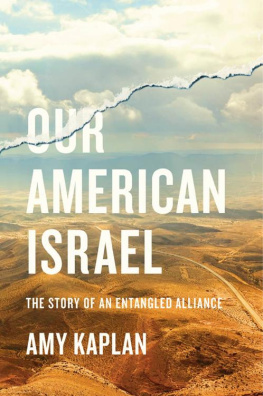







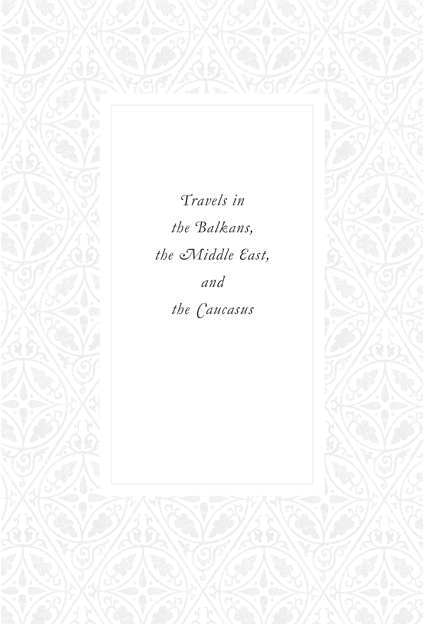
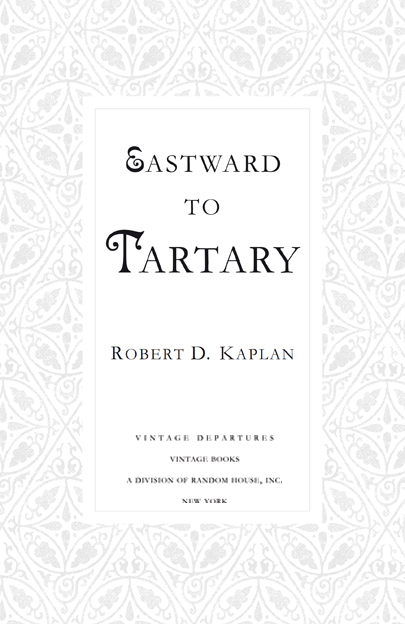
 First Vintage Departures Edition, November 2001
First Vintage Departures Edition, November 2001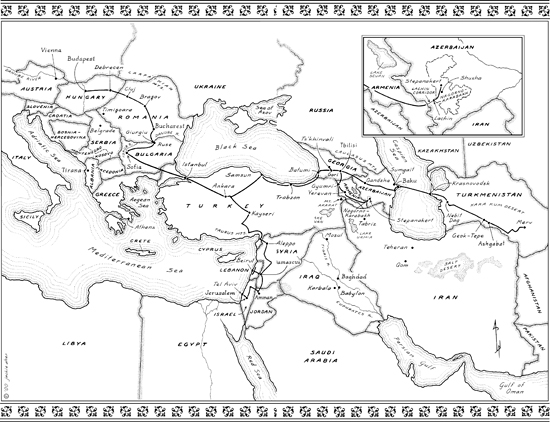
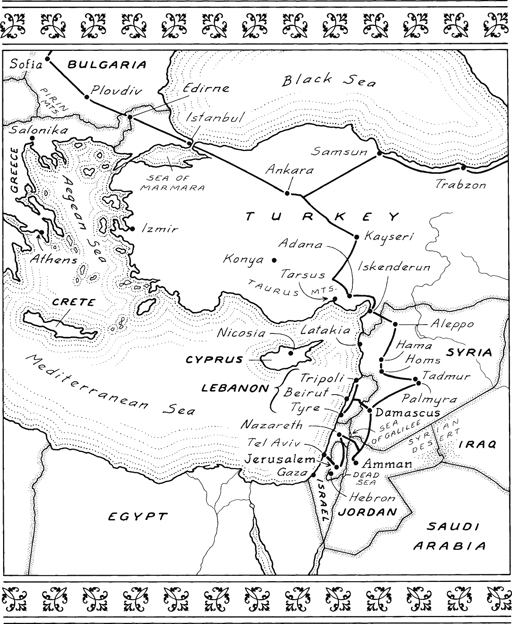
 Balkan Ghosts, to which the first part of this book is a sequel, was a portrait of the Balkans at the end of the 1980s that tried to anticipate the problems there in the 1990s. Likewise, Eastward to Tartary portrays the Greater Near East at the turn of the twenty-first century, and looks forward to the next decade or so in that region.
Balkan Ghosts, to which the first part of this book is a sequel, was a portrait of the Balkans at the end of the 1980s that tried to anticipate the problems there in the 1990s. Likewise, Eastward to Tartary portrays the Greater Near East at the turn of the twenty-first century, and looks forward to the next decade or so in that region.